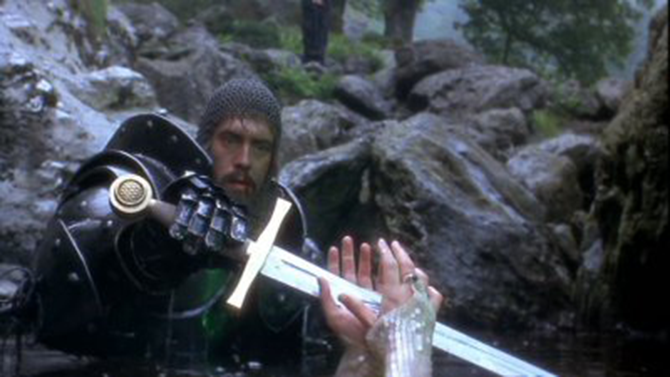There have been many attempts at turning the King Arthur legend into film – from bloated action tales and Cold War bewilderment (where the villains wear Soviet Union red outfits), to animated Disney classics, but the movie that best captures the true essence of the historic tale is the 1981 John Boorman (Deliverance) epic Excalibur.
Based mostly on Thomas Malory’s 15th Century story Le Morte d’Arthur, the tale begins with a land in conflict. We follow Uther (Gabriel Byrne), the father of our protagonist Arthur, who receives the sword Excalibur from the wizard Merlin (Nicol Williamson) and forms a tentative peace with his enemies until he lusts after his new ally’s wife Igrayne. This once again ignites war and Uther asks Merlin to transform him into his enemy for a night with the beautiful lady. The magician agrees – though forces Uther to swear to give up the baby that will be born of his lustful passion. Boorman skillfully transforms Uther as he rides above the misty water toward the castle. Merlin takes the baby after it is born and soon after Uther is ambushed and killed, but not before famously casting the sword in the stone.
The story continues some years later when we find Arthur (Nigel Terry) being raised by Sir Hector (Clive Swift) and acting as squire for his older brother Kay (Niall O’Brien). Fatefully, Arthur is the only man who can pull Excalibur from the stone and those who witness it are divided. He comes to the aid of his ally Leondegrance (Patrick Stewart) as those against him have stormed the man’s castle. In a moment of utter mayhem, Arthur hands Excalibur to his enemy in order to be properly knighted and thus wins over all of the naysayers.
Arthur then unites the nation, bests Lancelot (Nicholas Clay), who then becomes his greatest knight, and builds his magnificent castle Camelot. Finally, every king needs a bride and Arthur falls in love with Leondegrance’s daughter Guenevere (Cherie Lunghi). Everything seems to be headed towards a happily ever after ending, but we know this is not so.
As in real life, nothing is perfect. Lancelot and Guenevere harbour a deep love for each other that they try to hide. Gawain (Liam Neeson) brings forth this idea at the Round Table and the union that was once so strong begins to crumble. On top of this, the seductive sorceress Morgana (Helen Mirren), who is Arthur’s half-sister, fools Merlin and interferes in the court. She then uses her tricks to seduce Arthur and has a child with him, who she then molds into his sworn enemy so that he will eventually lead an army against his father/her half-brother.
What this movie did that others before and many after have not, is show the true gritty nature of the Dark Ages, its wars and battles. This medieval period is often romanticized with princesses, knights in shining armour and winnable adventures. Instead, Boorman shows the sacrifice, strife, pain, starvation, violence and death found in this historic tale. Battles are not sterile but bloody, dirty and appalling. Likewise, most knights who head out on a quest are killed in horrific ways. It is not glamourized as many other films are.
Boorman’s style is also impressive. His visual flair leaves every frame full of beautiful colours and memorable scenes. It has also been highly influential. You will see touches of this film when watching pictures like The Lord of the Rings trilogy or television shows such as Camelot or Game of Thrones. One of the most impressive scenes of the film is when Arthur is rejuvenated after he drinks from the Holy Grail and rides into battle. With Wagner playing in the background, we see beautiful trees blossoming before our eyes – a scene that was shot as it was happening (no CGI here). You will see something similar in The Return of the King when Aragorn becomes king and the White Tree blossoms in much the same way. The final gruesome battle with the giant bright red sun in the background is also brilliantly done.
The actors do an impressive job bringing their characters to life. Though sometimes overacted, the cast usually brings forth dynamic performances that display both the good and the bad within man. Percival (Paul Geoffrey) displays the ‘true loyalty’ of a knight as he transforms from a pickpocket to the most pure and faithful of Arthur’s Round Table – and the only man who is worthy to achieve the goal of recovering the Holy Grail. Nicholas Clay as Lancelot exhibits a combination of heroism and human weakness in a role which asks him to be both perfect and imperfect. Nicol Williamson’s stage acting background adds real drama to the role of Merlin while Helen Mirren is seductive and sultry as the sorceress Morgana.
Excalibur is a stunning film that captures the essence of the Arthurian legend; mixing together superb visual direction from John Boorman and his crew, mostly strong acting from a cast that contains many future movie stars, and a strong screenplay which captures the reality of the Middle Ages in all of its harshness. Together, these elements create a crowning achievement that would and will influence fantasy epics for years to come.

